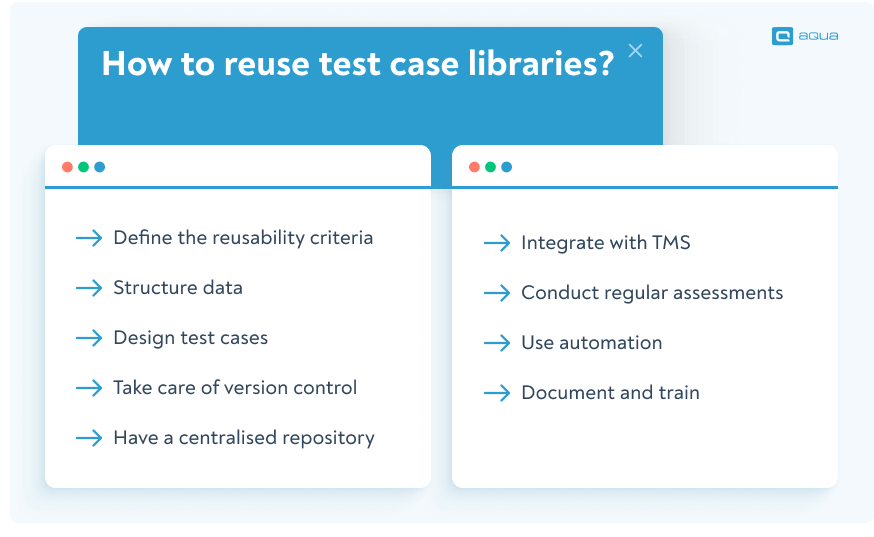What are the test case libraries?
A software test case library is a structured repository where test cases are stored, managed, and retrieved. It’s similar to a well-organised digital bookshelf, where each test case is a book, ready to be picked up and read (or, in this case, executed) whenever needed. The test case library categorises each test case in a manner that’s easy to navigate, ensuring that testers can effortlessly find what they’re looking for.
A typical test case library includes various attributes for each test case, like its description, objectives, pre-conditions, steps to execute, expected results, and post-conditions. The meticulous organisation within a test case library paves the way for testers to not only store test cases but to visualise the relationships between different test cases, thus enabling a more strategic approach to testing.
Moreover, with modern test management tools, test case libraries have evolved beyond mere storage facilities. They now offer features like version control, traceability, shared test steps and integration with other testing and development tools, fostering a more collaborative and effective testing environment. Additionally, software test case reuse provides many advantages, which we’ll delve into in the following section.
"A test is a question which you ask of the program. The answer (what the program does) tells you whether the program passed or failed that test."
Importance of Test Case Reusability
In the quest for enhanced testing efficiency and effectiveness, the principle of reusability stands tall. When diving into the Test Case Libraries, you should not overlook the essence of Test Case Reusability. Here’s a peek into why this aspect is a cornerstone for improving your testing process:
- Cost Efficiency: Reusing test cases across applications slashes the need for crafting new ones from scratch for every project or even different phases of the same project. This cost-effectiveness transcends the monetary spectrum, encompassing the savings in time and effort, which are equally paramount.
- Consistency and Accuracy: Reutilising well-structured and proven test cases fosters consistency across the testing process. It mitigates the margin of error that might arise when creating new test cases for library management, thus elevating the accuracy and reliability of the testing endeavours.
- Accelerated Delivery: Having a repository of reusable test cases is akin to having a treasure trove. It significantly accelerates the testing phase, ensuring projects stay on schedule or ahead, which is a potent competitive advantage.
- Knowledge Retention: Test case libraries act as knowledge repositories. They encapsulate the testing wisdom accrued over time, ensuring that the insights and understandings do not dissipate with personnel changes or project transitions.
- Compliance and Traceability: Especially in regulated industries, reusing test cases across applications ensures that compliance requirements are consistently met. Reusing test cases in regulated industries ensures consistent testing across multiple applications, helping organisations meet compliance requirements. It provides a documented testing history, saves time, leverages proven solutions, and allows validation across application variants, all contributing to maintaining compliance efficiently.
- Enhanced Focus: With a chunk of the groundwork done, testers can channel their focus and resources on more complex, project-specific testing challenges, thus elevating the quality and effectiveness of testing.
- Continuous Improvement: The feedback loop from the reuse of test cases fosters a culture of continuous improvement. It provides invaluable insights into the strengths and areas of improvement for the test cases, driving a cycle of refinement and optimisation.
The beauty of reusability in a test case library isn’t merely about having a static repository; it’s about cultivating a dynamic asset that evolves, enriches, and empowers the testing process over time.
In the quest for an effective solution to take away the pain of testing, aqua cloud stands out as a powerful ally. With aqua, you can structure your test case library for optimal organisation and prioritise test cases for better testing efficiency. Additionally, you can implement granular access levels for improved security, achieve 100% traceability and version control for regulatory compliance, visualise test coverage for comprehensive testing strategies, unlock effortless test case reusability, and much more. This isn’t merely about reusing test cases; it’s about evolving them to drive project success. aqua empowers you to make every test case a stepping stone towards identifying, predicting, and resolving quality hurdles. Ready to experience AI’s power in QA and aqua’s detailed capabilities?
Boost your testing process for a 70% increase in efficiency
How to build an effective Test Case Library?
Building an effective test case library can be compared to laying down a robust foundation for a house. The stronger the foundation, the more resilient the house is to various adversities. A well-structured test case library is your shield against the inefficiencies and inconsistencies that could derail your testing process. Let’s delve into how to build his shield:
Identify Core Requirements
- Understand the testing requirements and the goals you aim to achieve with the test case library.
- Define the types of tests that will be stored and the attributes each test case should possess.
Organise Structured Data
- Employ a consistent naming convention for test cases to ensure easy identification and retrieval.
- To keep the library organised, define a clear hierarchy and categorisation based on functionality, modules, or other relevant parameters.
- Utilise tags and metadata to enrich the test case information, facilitating advanced search and filtering.
Utilise a Robust Platform
- Choose a platform that supports the creation, management, and retrieval of test case libraries effectively.
- Ensure the platform provides version control to track changes over time and maintain a history of revisions.
Ensure Scalability and Flexibility
- Design the library to be scalable to accommodate growing test case volumes and evolving project needs.
- Ensure the structure is flexible to allow modifications as testing requirements change.
Standardise Templates
- Create standardised templates for test cases to ensure uniformity in data capture.
- Templates should encapsulate essential attributes like description, pre-conditions, steps, expected results, and post-conditions.
Secure Integration Capabilities
- Ensure your Test Case Library can integrate with other testing and development tools to foster a collaborative environment.
- Integration with an AI test management tool can further enhance the efficiency and effectiveness of your test case library.
Enable Access Control and Permissions
- Set up access control to ensure only authorised personnel can add, modify, or delete test cases.
- Establish different permission levels to maintain the integrity and security of the test library.
Regularly Review
- Conduct regular reviews to ensure the relevance and accuracy of the test cases.
- Establish a process for updating, archiving, or deleting obsolete or redundant test cases.
Educate and Train the Team
- Ensure the team is well-versed in the structure, usage, and best practices associated with the test case library.
- Conduct training sessions and share documentation on utilising the test case library effectively.
Incorporating these practices when building your test case library will pave the path towards a more streamlined, organised, and efficient testing process. Furthermore, a well-structured test case library is a stepping stone towards achieving the reusability of test cases across applications.
How to reuse test case libraries?
Reusing test case libraries is akin to having a seasoned chef in your kitchen, ready to whip up tried-and-tested recipes, ensuring both efficiency and a delightful outcome. However, the knack lies in knowing when and how to engage this chef to bring out the best on your platter.
Initially, you need to define the reusability criteria. This involves establishing clear benchmarks based on functionality, application type, or industry standards. Identifying the generic parts of the test cases that can be reused across different projects or applications is a part of this phase.
Now, onto the heart of the matter – structuring data. The data within your test cases should be structured to facilitate reuse. A consistent naming convention, tagging, and categorisation are like the signboards that lead the way to the treasure trove of reusable test cases.
A modular approach to designing test cases further enriches the reuse capability. In a modular design, each module performs a specific function akin to a Lego piece. Just as Lego pieces can be combined in myriad ways to build different structures, modular test cases can be mixed and matched to form new test scenarios.
The next thing you need to take care of is version control, which is your ally in ensuring that the latest and the most effective version of a test case is what gets reused. It also provides a clear audit trail, which is indispensable for maintaining quality and compliance.
Furthermore, having a centralised repository to house all your test cases is like having a well-organized library where each book is a gem ready to impart wisdom. Ensuring easy access to this repository for all relevant team members fosters a culture of shared resources and collaborative efficiency.
Another thing to note is the integration with test case management tools, which can serve as the bridge that connects your test case library with the wider testing landscape, streamlining the reuse process.
The road to effective reuse is not a one-off journey but a continuous cycle of review and improvement. Regular assessments to identify opportunities for enhancement and seeking feedback from the team on ease of reuse are the stepping stones to refining the reusability of your test case libraries.
Automation, where feasible, is the turbo engine that accelerates the process of identifying, retrieving, and implementing reusable test cases. It’s about letting the machines do the grunt work, freeing up your team to focus on more strategic, high-level aspects.
Lastly, documentation and training are the compass and map for your team on this reuse journey. Comprehensive documentation guides the team on how to reuse test cases effectively, and training sessions ensure everyone is well-versed with the best practices for reusing test case libraries.

Conclusion
In software testing, the power of reusability through well-organised test case libraries is undeniable. It’s not just about creating a static repository but cultivating a dynamic asset that evolves, enriches, and empowers the testing process over time. By understanding the significance of reusability, its benefits, and the best practices for building and reusing test case libraries, testing teams can elevate their efficiency, accuracy, and quality while ensuring compliance and traceability. Now, as we wrap up this journey of exploring the world of test case libraries and reusability, it’s time to put these insights into action.
Suppose you are seeking a solution to streamline your testing process and harness the full potential of your evolving test case library. In that case, aqua cloud offers a robust, AI-driven platform that can transform your testing efforts. With aqua, you can structure your test case library for optimal organisation and prioritise test cases for better testing efficiency. Also, you can implement access levels for improved security, achieve full traceability and version control for regulatory compliance, visualise test coverage for comprehensive testing strategies, unlock effortless test case reusability, and much more. aqua isn’t merely about promising success; it’s about providing the capabilities to make every test case a stepping stone towards predicting and resolving quality hurdles. Ready to experience the power of AI in QA and the detailed capabilities of aqua cloud?
Transform your testing process with confidence







